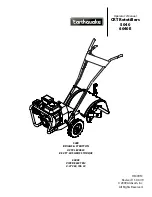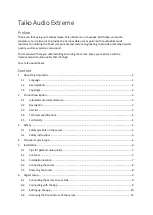
1.General Safety Requirements
1
1.
General Safety Requirements
Before use, please read the following safety precautions to avoid any possible bodily
injury and to prevent this product or any other connected products from damage. In
order to avoid any contingent danger, ensure this product is only used within the
range specified.
Only the qualified technicians can implement the maintenance.
To avoid Fire or Personal Injury:
Connect the probe correctly.
The grounding end of the probe corresponds to the
grounding phase. Please don't connect the grounding end to the positive phase.
Use Proper Power Cord.
Use only the power cord supplied with the product and
certified to use in your country.
Connect or Disconnect Correctly.
When the probe or test lead is connected to a
voltage source, please do not connect and disconnect the probe or test lead at random.
Product Grounded.
This instrument is grounded through the power cord grounding
conductor. To avoid electric shock, the grounding conductor must be grounded. The
product must be grounded properly before any connection with its input or output
terminal.
When powered by AC power, it is not allowed to measure AC power source
directly, because the testing ground and power cord ground conductor are
connected together, otherwise, it will cause short circuit.
When powered by battery, the product must ground connection. To avoid electric
shock, there must be a ground wire connect between ground and the ground port
(on the back of product panel).
Check all Terminal Ratings.
To avoid fire or shock hazard, check all ratings and
markers of this product. Refer to the user's manual for more information about ratings
before connecting to the instrument.
Do not operate without covers
. Do not operate the instrument with covers or panels
removed.
Use Proper Fuse.
Use only the specified type and rating fuse for this instrument.
Avoid exposed circuit
. Do not touch exposed junctions and components when the
instrument is powered.
Do not operate if in any doubt.
If you suspect damage occurs to the instrument, have
it inspected by qualified service personnel before further operations.
Use your Oscilloscope in a well-ventilated area.
Make sure the instrument installed
with proper ventilation, refer to the user manual for more details.
Do not operate in wet conditions.
Do not operate in an explosive atmosphere.
Keep product surfaces clean and dry.







































